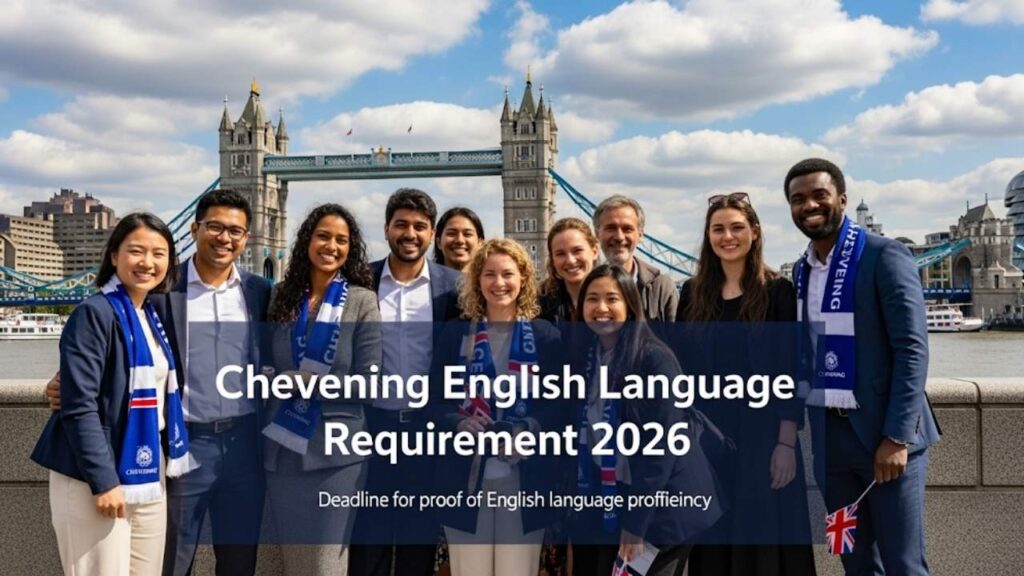Navigating the Chevening English Language Requirement 2026 can feel like trying to solve a puzzle, but it doesn’t have to be. You’ve got the ambition, the leadership potential, and the vision to make a difference. The last thing you need is for bureaucratic hurdles to stand in your way. This guide is here to demystify the process, provide you with a clear roadmap, and empower you to confidently meet the requirements. Think of it as your trusted co-pilot on this journey to securing a prestigious, fully funded master’s degree in the UK.

Chevening English Language Requirement 2026
| Key Fact | The Detail | Why It Matters |
| Chevening’s Waiver | Chevening itself has waived the requirement for applicants to provide a separate English language test score. | This simplifies the initial Chevening application, but it doesn’t remove the English proficiency hurdle entirely. |
| University’s Authority | Your chosen UK universities set their own English language standards for admission. | You must meet the university’s criteria to receive an unconditional offer, which is mandatory for the scholarship. |
| Strategic Timing | You must secure your unconditional university offer by the deadline set by the Chevening Secretariat (typically in July). | This means you cannot wait until you know if you’ve been awarded the scholarship to prove your English ability. |
The Big Shift: Understanding the Chevening English Test Waiver
For years, submitting an English test score from providers like IELTS or TOEFL was a non-negotiable part of the Chevening application itself. However, in a significant policy shift, this is no longer the case. According to the official Chevening website, Chevening does not ask applicants to prove their English language ability at the application stage.
So, you can breathe a sigh of relief, right? Well, yes and no.
This change simplifies the initial form-filling, allowing you to focus purely on your essays, references, and course choices. However, it shifts the responsibility entirely onto you. The real task is now to satisfy the individual English language requirements of the three UK university courses you’ve listed in your application.
I’ve seen many successful applicants focus on their essays first and foremost, which is crucial. But remember, your brilliant essays mean nothing if you can’t secure a place at your chosen university because of a missed English test deadline.
Your Real Hurdle: Meeting Your University’s English Requirements
Think of Chevening and your chosen universities as two separate gatekeepers. Chevening has waved you through its English language gate, but the university gate is still firmly in place. To get your scholarship, you must receive an unconditional offer from one of your top three university choices. An unconditional offer means you have met all academic and administrative conditions, including English proficiency.
How to Find Your University’s Specific Requirements
Finding the exact scores you need is a straightforward treasure hunt. Here’s how you do it:
- Go to the University Website: Navigate to the official website of the university you’re interested in.
- Find Your Course Page: Search for the specific master’s degree you plan to study.
- Look for “Entry Requirements”: On the course page, look for a section typically labelled “Entry Requirements,” “Admissions,” or “For International Students.”
- Locate the English Language Section: Within that section, you’ll find the specific tests and minimum scores they accept. Bookmark this page for each of your three course choices!
Common English Tests and Typical Scores
While every university has its own standards, most UK institutions accept a core set of internationally recognized tests.
| Test Name | Typical Overall Score Required | Typical Minimum Score Per Section |
| IELTS Academic | 6.5 – 7.5 | 6.0 – 7.0 |
| TOEFL iBT | 90 – 110 | 20 – 25 |
| Pearson (PTE) Academic | 62 – 76 | 59 – 76 |
| Cambridge C1 Advanced / C2 Proficiency | 176 – 191 | 169 – 185 |
Strategic Planning for Your English Test
Success with Chevening is all about strategic planning. Leaving your English test until the last minute is a recipe for stress and potential disappointment.
When Should You Take the Test?
The golden rule is: plan to take your test long before you need the results. The Chevening deadline for receiving an unconditional university offer is usually in mid-July.1 Factoring in test dates, result processing times (which can take a few weeks), and potential retakes, you should aim to sit for your test no later than January or February of 2026.
This timeline allows you to:
- Receive your scores and submit them to your universities.
- Give universities enough time to process your results and upgrade your offer from “conditional” to “unconditional.”
- Have a buffer period in case you need to retake the test to improve a specific section’s score.
Tips for Acing Your English Proficiency Test
Preparing for a high-stakes test is a marathon, not a sprint.

- Understand the Format: Each test (IELTS, TOEFL, etc.) has a unique structure. Spend time on the official test websites to understand the question types for reading, writing, listening, and speaking.
- Practice with Purpose: Don’t just do endless mock tests. Analyze your mistakes. Was it a vocabulary issue? A time management problem? Focus your practice on your weakest areas.
- Build Your Stamina: These tests are long and require intense focus. Practice under timed conditions to simulate the real experience.
- Don’t Neglect Speaking: Many applicants focus heavily on reading and writing. Practice speaking about varied topics, record yourself, and work on fluency, coherence, and pronunciation.
Are You Exempt? The Exception to the Rule
In some specific cases, you may not need to take an English test at all. Universities may grant you an exemption if you:
- Are a national of a majority English-speaking country as defined by the UK Home Office. This list typically includes nations like the USA, Canada, Australia, and New Zealand.
- Have recently completed a degree-level qualification that was taught and assessed entirely in English. You will need to provide official evidence from your university confirming this.
Crucially, do not assume you are exempt. You must get written confirmation of your exemption directly from the university’s admissions office. The decision rests solely with them, not with Chevening.
Your Next Steps to Success
The Chevening English language requirement is less of a direct command and more of a critical checkpoint on your journey. While Chevening has eased its own rule, the emphasis on proving your English skills to your chosen universities is greater than ever.
Don’t let this component intimidate you. See it as the first concrete step toward your UK education. By understanding the requirements, planning strategically, and preparing diligently, you can confidently clear this hurdle. You’re not just aiming to pass a test; you’re proving you have the communication skills to thrive as a future leader and scholar in the UK. Start your research today, book your test early, and move one giant leap closer to achieving your Chevening dream.
A Guide to the Macquarie Sports Scholarship 2025
Your Complete Guide to Fully Funded PhD Scholarships Abroad 2026
FAQs
Q1:Do I need to submit an English test score with my initial Chevening application?
No. For the 2026 entry (based on the current policy), you do not need to provide an English test result when you first submit your Chevening application. You only need to prove your English proficiency to your chosen universities later in the cycle.
Q2:What happens if I don’t get an unconditional university offer by the deadline?
You must have an unconditional offer from one of your three course choices by the deadline specified by the Chevening Secretariat (usually mid-July).2 If you fail to meet this condition, you will unfortunately be unable to proceed with the scholarship for that year.
Q3:Can Chevening pay for my English language test?
No. The cost of taking an English proficiency test and sending the results to universities is a personal expense that applicants must cover themselves. It is not included in the Chevening award.
Q4:Which English test is the easiest for Chevening?
There is no “easiest” test. The “best” test for you depends on two things: which tests your preferred universities accept and your personal strengths. Some people find the speaking section of IELTS more comfortable, while others may prefer the computer-based format of TOEFL or PTE. Research the formats and choose the one that aligns with your skills and your universities’ requirements.










